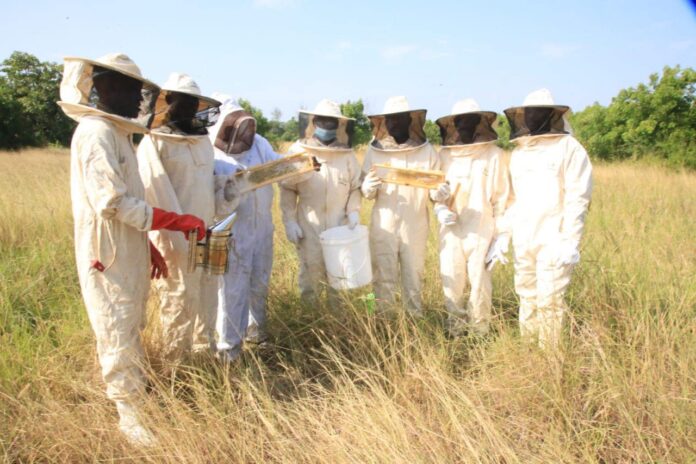The International Centre of Insect Physiology and Ecology (icipe) and the Mastercard Foundation have signed a five-year agreement for a new initiative that will directly benefit 1 million unemployed Ethiopian young people in beekeeping.
Dubbed the Mass Youth Employment in Apiculture Programme (MaYEA) in Ethiopia, the programme targets 80% of its employment opportunities to vulnerable, rural, and peri-urban young women, and an additional 10% to people with disabilities and refugees.
In this, the Mastercard Foundation has committed USD 79.96 million, out of which USD 9.3 million will go to icipe for the implementation of the programme.
Leveraging on the previous success
The new initiative will be leveraging on the previous achievements and incorporating an even wider consortium of partners on the more ambitious goal.
Over the past eight years, the Mastercard Foundation, icipe and private and public sector stakeholders, have implemented two major initiatives that have provided an indisputable, highly successful model to use integrated beekeeping to generate dignified and fulfilling jobs for masses of young people in Ethiopia, and an entry point for a One Health approach to socio-economic transformation.
Through the Young Entrepreneurs in Silk and Honey project (YESH project, implemented from October 2015 – November 2021), and the More Young Entrepreneurs in Silk and Honey project (MOYESH project, which commenced in October 2019 and will run until September 2024), 11,877 youth-led beekeeping enterprises and 1,117 youth-led sericulture enterprises have been established, leading to direct jobs for about 144,082 young people, 82,603 of them women.
The two initiatives have had a transformative effect on Ethiopia’s apiculture and sericulture sectors, capitalising on advantages while contributing to system-level changes to unlock bottlenecks.
Other partners of the MaYEA programme include ORDA Ethiopia, International Institute of Rural Reconstruction (IIRR), Bees for Development Ethiopia (BfDE), Population Health and Environment Ethiopian Consortium (PHE-EC), SOS Sahel Ethiopia, and Movement for Ecological Learning and Community Action-Ethiopia (MELCA-Ethiopia).
“MaYEA builds up on the gains made, and lessons drawn from the YESH and MOYESH projects, by using integrated, beekeeping as an entry point to sustainably improve plant, human and environmental health. Honey bees play multifunctional roles beyond the production of honey, beeswax and other hive products. They deliver vital insect pollination services to food and industrial crops, forages, forest trees and other plant biodiversity,” says Dr Segenet Kelemu, Director General and CEO, icipe.
She added: “Our continued partnership with the Mastercard Foundation through the MaYEA programme endeavours to harness these services to generate dignified jobs for young women and men in an ecosystem where young people become integral contributors to the economy, by providing them with the necessary skills, tools and resources for building sustainable enterprises, and establishing linkages to markets to develop the apiculture sector and allied value chains, while also contributing to regeneration of the environment.”
Building on the previous established basis
The MAYEA programme will build on a solid foundation established through the YESH and MOYESH projects that includes: a clear alignment to national and regional developmental agendas in Ethiopia; a reciprocal relationship with government partners; strategies to alleviate systemic challenges in the apiculture value chain; and innovative approaches to enable more women to enter and thrive in beekeeping, which has historically been a predominantly male occupation, in the country. This collaboration enables a socially and gender-inclusive strategy to recruit, train and equip partnering youth in a cost-effective and sustainable manner.
Local governments have committed to allocate land to the youth enterprises. This is either land that is degraded or adjacent to natural resource-rich ecosystems that need rehabilitation and conservation, thus providing a more compelling and sustainable way to safeguard natural resources. The land allocation and aggregation of the youth partners into cooperatives and enterprises helps to mainstream beekeeping as a worthwhile and lucrative income generation occupation and to adopt modern beekeeping technologies, which would otherwise not be profitable in smaller initiatives. It also allows agribusiness diversification.
Unique training format
Also in place is a unique training format that promotes knowledge and social capital, incorporating technical skills for honey bee colony multiplication and queen bee rearing, honey and beeswax production, postharvest product handling methods, processing and packaging; and entrepreneurial skills development, which imbues in the youth partners the hard and soft skills required to own and run a business successfully.
Business-to-business linkages and digital marketing technologies have been instituted, while alliances among banks and microfinance institutions are now advancing loanable funds to the youth enterprises. Novel niche opportunities for input suppliers have been created, for example, in the manufacture of frame hives and protective beekeeping clothing. In addition, private sector partners are supporting the enterprises through contract farming and out-grower business schemes to start beekeeping and business diversification.
“Building on the success and insights from the YESH and MOYESH partnerships, MaYEA will attract and engage the next generation of young beekeepers (particularly women) in high-quality, high-volume honey production and value addition, creating Ethiopian honey brands for international markets, while addressing key bottlenecks affecting the apiculture sector. The programme partners will access relevant skills, markets, improved technologies/practices, and financial services. MaYEA will enable over a million young people (800,000 young women) to access dignified and fulfilling work. Leveraging icipe’s expertise and experience, MaYEA will nurture strong local partners that can design, implement, innovate, and transform apiculture to enable sustainable livelihoods for young women in Ethiopia and make Ethiopian honey known in the market,” said Samuel Yalew Adela, Mastercard Foundation Country Director for Ethiopia.









